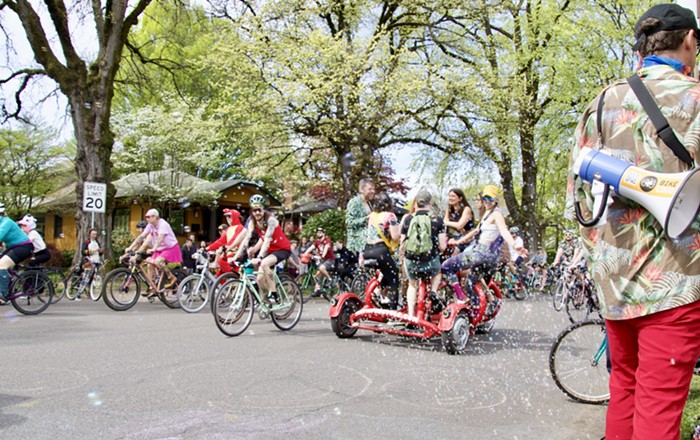
Portland's years-long wait for bike share ends July 19.
That morning, 1,000 bright orange bikes emblazoned with the Nike swoosh will be up for grabs as far north as Killingsworth, and as far south as roughly Clinton Street and the South Waterfront. People in Downtown and Northwest Portland will practically be stumbling over stations—19 of them per square mile—while east-siders (at least those living within an eastern boundary that fluctuates between NE 7th and SE Cesar Chavez) will need to plan a little more carefully.
Biketown is almost here, Portland. And we've got new details.
The Portland Bureau of Transportation on Monday unveiled for the first time a final bike share station map—100 system-specific bike corrals pared down from 305 possibilities. Check it out:
The bureau also released its price structure, which has three options for purchasing bike time: by the trip, by the day, and by the year.
Annual memberships will cost $144 a year, or $12 per month (including 90 minutes per day of ride time). That's lower than a $15 per month fee officials had mulled last year, but it's more expensive than annual passes in cities like Washington DC (between $7 and $8 per month), Chicago ($9.95), and Seattle ($7.95). It's less expensive than NYC's $14.95 per month system.
(If you're really jazzed about bike share, you can sign up as early as Tuesday morning at 6 am on Biketown's website. First 500 people to do so get a month free. The first 1,000 people get a t-shirt, and status as "founding members.")
Meanwhile, that same $12 will also purchase 24 hours of system access (with 180 minutes of total ride time), if you don't want the full membership. And Portland has also decided to offer something not seen in some cities: A single ride pass, for up to 30 minutes, will set you back $2.50.
Go beyond your allotted time for any of those options, and you'll be charged 10 cents a minute.
Where you park your bike also figures into your cost. Biketown is slated to be the largest "smart bike" system in the country, meaning the bright orange rigs have computers and locks on the back that allow you to lock and unlock the bike pretty much anywhere. But there's a fee for the convenience of not taking your bike back to an official station: $2. (Conversely, if you find a bike that's been parked away from a station and bring it back to one, you get a $1 credit). And parking the bike outside of Biketown's centrally located service area will cost you $20.
About that service area: It's unchanged from March, when PBOT began accepting input for more than 300 potential stations. The biggest news out today is where the 100 officials selected will be—and where they won't. Popular southeast corridors like Hawthorne, Belmont, and Division, for instance, are well-stocked with bike stations. Alberta (and the vast majority of Northeast Portland in general) don't have any.
It was always supposed to be this way. With a limited rollout (though 1,000 bikes is larger than Portland envisioned before Nike came on board), the bike share system has been billed as a central city amenity first. Demand is highest there, between jobs, tourists, and general density. As revenues allow, PBOT has said it will seek to expand bike share into other parts of the city.
Even given all that, there are some pretty barren portions of the eastside service area. While 2.5 square mile area west of the river has nearly 19 stations per square mile, the 5.6 square miles east side of the Willamette have roughly half that. One bare patch I noticed right away: This bike share desert east of the Broadway Bridge.

Steve Hoyt-McBeth, the PBOT project manager who's running point on Biketown, says there are plenty of places the bureau wanted to put bike share, but it was limited to 100 options. The ultimate decisions were based on more than 4,500 online comments, 5 open houses, dozens of community meetings, and an analysis of demand.
"There are many more stations that we wanted to put down," Hoyt-McBeth says. "We chose to put stations where we had the highest demand. We would love to fill [the network] in."
Hoyt-McBeth is insistent that the system is equitable within its service area. That area contains a little less than 13,000 affordable housing units, Hoyt-McBeth says, which is around 55 percent of the nearly 23,600 affordable units in Portland tallied by Metro last year. Of those 13,000 affordable units, 96 percent live within a quarter mile of a bike share station, and more than 60 percent live within several hundred feet, according to PBOT.
The city's also working with the Community Cycling Center on using a $75,000 federal grant to create the equivalent of 500 low- or no-cost annual memberships for disadvantaged Portlanders.
How's this all going to play in the country's bikey-est big city? PBOT and Motivate, the company that's running the system, are anxious to find out. Dorothy Mitchell, Biketown's general manager, said today she thinks the 500 reduced price annual memberships ($132 instead of $144) will get snapped up fairly shortly. The hope is that 1,000 annual memberships are purchased prior to launch.
You'll begin to see stations springing up around town by early July.













